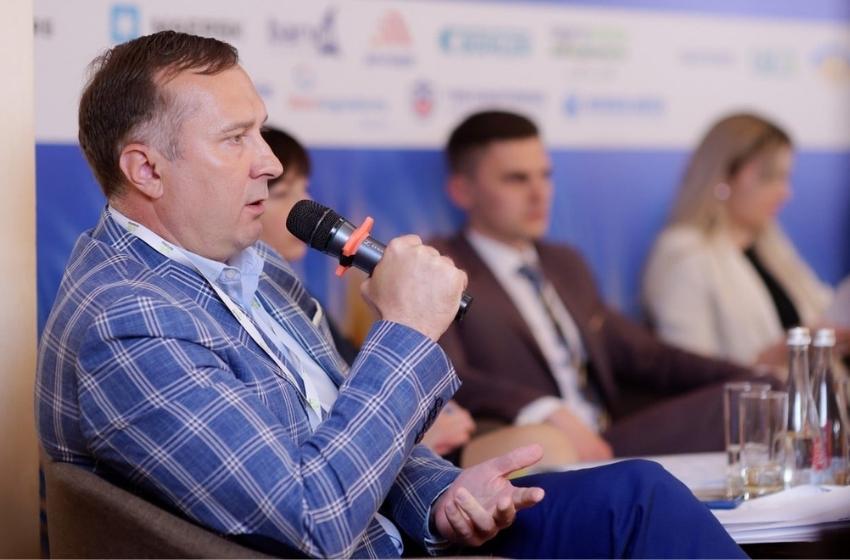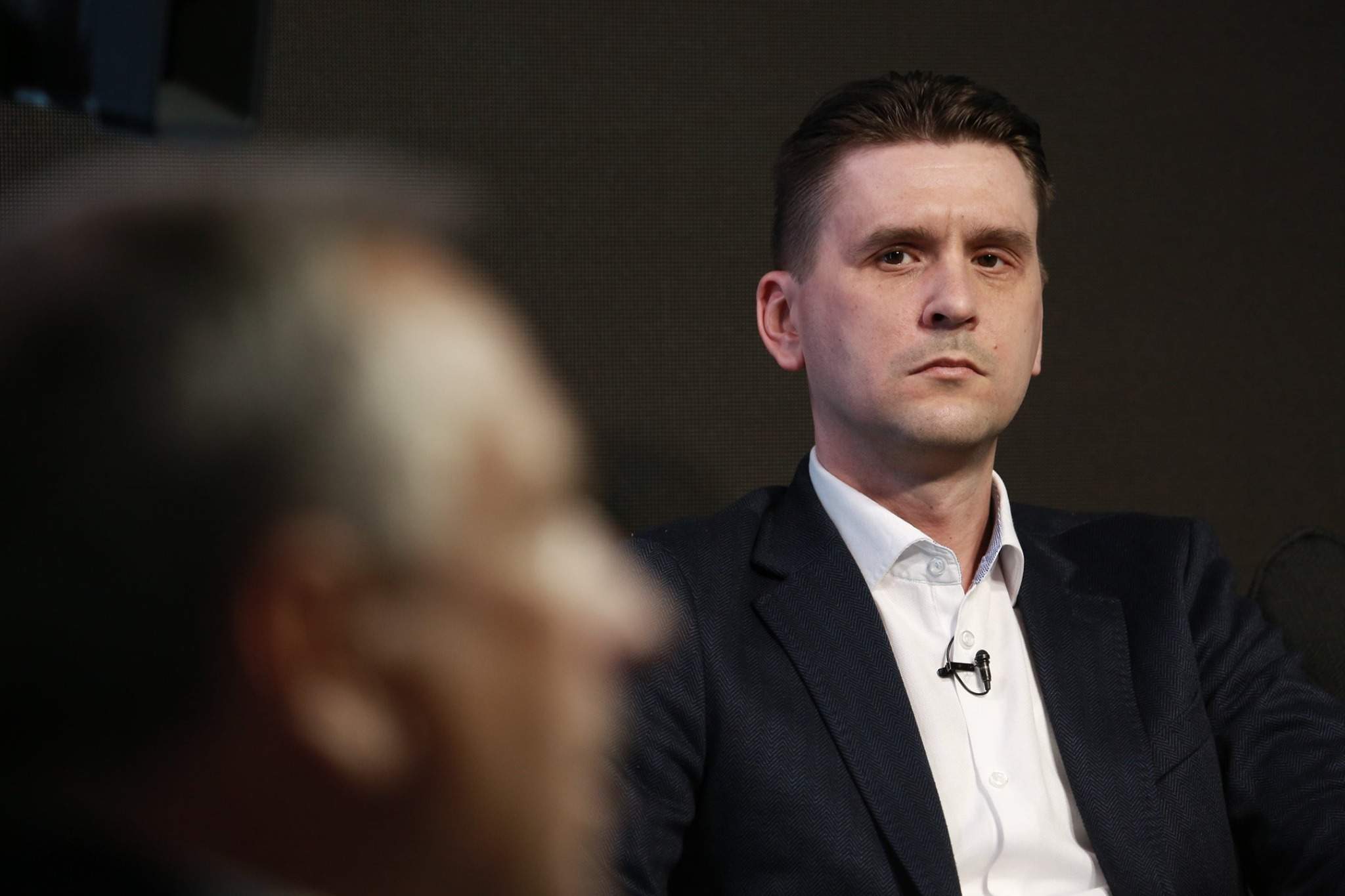Kateryna Morozova, Team Lead of EBA Southern Ukrainian Office speaking about the TOP priorities for the government and business in the development of Infrastructure Reforms 2021.
On May 27, 2021, in the framework of Grain & Maritime Day in Odessa 2021, the EBA community held a discussion on "Infrastructure Reforms 2021: Challenges and Expectations" with representatives of the Ministry of Infrastructure, Ukrzaliznytsia and local businesses.
During the meeting, we discussed the TOP priorities for the government and voiced the vision of the business for the infrastructure reform development, as well as the tasks which are the key focus of the EBA Logistics Committee’s activities. Daria Sichkar, EBA Logistics Committee Manager, spoke in more detail about them and informed the participants about the adoption of the Law “On the National Commission for Transport Regulationâ€. Contrary to the requirements of the legislation, for many years there has been no state regulator in the field of transport - the National Commission for State Regulation of Transport.
At present, businesses expect that the new Minister will be able to gather the political will and facilitate the adoption of the draft law, considering the views of the business community, which will provide the creation of a fully independent and transparent body - the NCTR.
Particular attention was paid to the legislative acts which adoption is expected in the nearest future, namely the Procedure for Compensation of Investments in Strategic Port Infrastructure, the Methodology for Calculating Port Tariffs, and the Procedure for Collection, Accounting, and Use of Port Tariffs.
Also, for the full development of the marine and river industry, according to business, it is necessary to simplify the permitting procedure for construction work in the waters of seaports and inland water transport. To this end, the EBA Logistics Committee experts developed a draft law “On Amendments to Certain Legislative Acts of Ukraine Concerning Construction on Lands Occupied by Inland Public Waterways†and sent it to the Ministry of Infrastructure for consideration.
Besides, the business community expects the cutdown of the list of specialised services provided in the seaport, the development of leasing and privatisation processes in seaports for investment attraction (along with the concession), the revision of regulations and its alignment with the law “On Inland Water Transportâ€, adoption of the Law “On Railway Transportâ€, regulation of the situation with the limited number of road transport permits for transit through Poland, etc.
Commenting on the maritime and river industries reform, Olga Kopiika, Chief Legal Adviser and Public Relations Officer of Bunge in Ukraine, Chair of the EBA Logistics Committee, said:
“The challenges have remained the same for the last 5 years. The question is that during this time there were not many infrastructural reforms in the maritime sector. One of them was the Inland Water Transport reform. Thus, at the end of last year, an important change took place - the adoption of the sectoral Law "On Inland Water Transport". The next step is to update the regulations that need to be adopted or amended in connection with the new law".

Ms. Kopiika also focused on the White Papers on Ukrainian Seaports and Railway Sector, created by the EBA experts and key market players. These documents provided a detailed analysis of reforms and changes that need to be implemented. They also contain a long-term action plan with a stimulus to develop the maritime and railway industries in our country.
Also, they represent a balanced systemic vision for the creation and improvement of the regulatory framework of the relevant industries. Summing up her speech, Ms. Olga highlighted:
“Today we are faced with the fact that the Ministry is not ready to take drastic steps to reform the maritime sector. However, to keep up, we need to run seven miles to be competitive. Shippers need to be competitive in local markets of products and goods, and Ukrainian ports need to increase their competitive advantages. At present, it is necessary to introduce structural and qualitative reforms with economically justified tariffs, with deregulation that was started but then suspended. We have high hopes for this year that all the reforms we have planned will be implemented."

We invited Valerii Tkachov, Deputy Director of the Commercial Department of Ukrzaliznytsia, to discuss the reform of the railway industry. Mr. Tkachov shared his personal position on this issue:
"There are two ways of development and functioning of railway transport in the world. The first way is when the country has several independent railways (private and public), which have their own infrastructure and rolling stock and they are in competition with each other. Another way is when the railway infrastructure belongs to the state and there are several competing independent carriers (public and private) for freight and passenger transportation.
Ukraine has chosen the second vector of railway transport development. By signing the Association Agreement with the EU, we have committed ourselves to liberalize rail transport within 8 years and eliminate UZ's monopoly on the transportation of goods and passengers by rail, and plan to implement EU transport directives and legislation in the field of transport in Ukraine. Steps to reform the railway transport of Ukraine are established in the Action Plan for the reform of railway transport, approved by the CMU Order, and in other documents.
Reforming Ukraine's railway transport according to the European model is a very difficult task. And its solution requires the joint efforts of the legislature (Verkhovna Rada), the executive (Cabinet of Ministers, Ministry of Infrastructure, Ministry of Economy), and the efforts of UZ management. It requires the adoption of a law on railway transport, the development and adoption of a range of regulations, the creation of the NCTR, the transformation of the tariff system, the structural reorganization of UZ, and so on.
The most important task facing Ukrzaliznytsia is to divide the company into four functional verticals (freight carrier, passenger carrier, service and repair, infrastructure operator), and to establish a corporate center and allocate non-core assets. And UZ implements these measures. At the same time, it is now necessary to move from the regional to the functional principle of forming the structure of UZ. Also, we have a task to digitize all capacities of the railway infrastructure of Ukraine and only then to provide access to the general railway network for independent carriersâ€.
The development of dry ports in Ukraine and globally is becoming more relevant as there is a growing interest in the mass containerization of goods. Therefore, Karina Gorova, a senior lawyer at the International Legal Firm Interlegal, spoke about the prospects for the creation and operation of dry ports. Thus, a dry port or logistics hub is a transport terminal that is remote from a sea or river port, but which is directly connected to the seaport by road or rail.
The main objectives of their operation are unloading of ports, providing convenience for mixed transport operators/cargo owners, storing goods, transhipping from one mode of transport to another, assembling, conducting customs clearance, transferring the part of the flow of goods from roads to rail, increasing turnover, reducing rates for door-to-door delivery. In Ukraine, the discussion around dry ports has been started relatively recently. However, it has become clear promptly that dry ports have key obvious benefits.
Particular attention was paid to the importance of P&I Club guarantee letters, their practical application, and prospects of development. Thus, Serhiy Nedilko, head of the Odessa office of Ilyashev & Partners Law Firm, gave a detailed review of this instrument. According to Mr. Nedilko, the lack of a fast and effective mechanism for securing property claims of environmental inspectors has had an extremely negative impact on Ukraine's reputation and the attractiveness of Ukrainian ports.
However, in July 2020, the State Environmental Inspectorate of Ukraine for the first time adopted a "club" guarantee as to the only appropriate and sufficient provision of the maritime claim to the shipowner in connection with environmental pollution. This decision was made in relation to an incident with the spillage of vegetable oil from the NEW CHALLENGE vessel in the port of Mykolayiv, where the interests of the shipowner were represented by lawyers of the Odessa office of Ilyashev & Partners.

Another illustrative case was the incident with the STAVENGER vessel in the port of Yuzhniy, where the ship was released with the help of a "club" guarantee only in court. Thus, Order â„–16 of the Ministry of Environment, dated January 16, 2021, approves the Regulations on the procedure for calculating the amount of compensation and payment for damages caused by pollution from ships and other vessels of the territorial and internal sea waters of Ukraine. Mr. Nedilko shared his experience:
“Together with colleagues from EBA, we participated in the discussion of the draft Order and advocated for the regulation of the use of “club†guarantees, referring to practical incidents and case law. However, the attempt was unsuccessful, as the State Ecoinspection insisted that the regulation of the "club" guarantees status should be resolved by amending the Merchant Shipping Code of Ukraine and other procedural codes."
Olga Pulenko, an expert in the maritime sector of the Reform Support Team at the Ministry of Infrastructure of Ukraine, commented on the maritime reform and the attempt to regulate the provision of guarantees for R&I clubs. Olga Pulenko said:
“Continuing what Mr. Nedilko said, from an optimistic point of view, regarding P&I clubs, the Ministry of Infrastructure recently drafted a law on the issue, which includes provisions on regulating the market for towing services in Ukrainian seaports. As well as to regulate the issue of liability insurance of R&I clubs, the amendments were made to Articles 44 and 80 of the Merchant Shipping Code of Ukraine so that club guarantees can be used to ensure maritime claims. This draft law will be registered in the Verkhovna Rada within coming weeks.â€
Oleksandr Lazarev, Director of LAMARIN LLC, Co-Chair of the EBA Customs Committee, Chair of the EBA Odessa Coordination Council, shared his remarks on the harmonisation of customs activities with generally accepted norms and standards of EU law. Thus, he talked about the introduction of AEO and NCTS. The European Business Association has been working on these initiatives for many years.

Thus, the introduction of the AEO institute in Ukraine is expected to bring Ukraine's customs legislation closer to European standards, which not only simplifies and facilitates international trade but also ensures the participation of Ukrainian AEOs in forming secure supply chains and increasing their competitiveness both in domestic and foreign markets.
In addition, the country has recently launched a joint transit regime NCTS. It is expected that this regime will help reduce cargo delays at the border by increasing the efficiency of risk analysis and determining the list of necessary control procedures before the arrival of goods at the customs border of Ukraine.
Natalia Gudkova, Managing Partner of Advisers, Chair of the EBA Odessa Transport Working Group, moderator of the meeting, summing up the speeches of experts, noted that this spring the Verkhovna Rada adopted in the first reading draft Law â„– 4258 on Multimodal Transport. The need for its adoption is justified, namely, by the obligations of Ukraine under the Association Agreement with the European Union which includes the implementation of Council Directive 92/106/EEC of 07.12.1992.
"There is a lot of discussion about this comprehensive update of transport legislation. Businesses are interested in various issues, namely the operation of multimodal terminals, the responsibilities of multimodal transport operators, amendments to tax legislation for multimodal transport entities. Nevertheless, business is divided into those who support the adoption of this law and those who think it will bring considerable difficulties for the market. After all, the main thing is to ensure the effective and transparent mechanisms for implementation of international norms in Ukraine.â€
Finally, it should be mentioned, that the EBA Logistics Committee and the EBA Odessa Transport Working Group carry out intensive activities for the advocacy and protection of legitimate interests of EBA member companies, as well as devoted work to improve the regulatory environment of transport and logistics in Ukraine.
The European Business Association thanks the participants for a fruitful discussion. We are confident that together we will be able to implement all the discussed changes and more.

Read more:
- EBA: Mastering the distance management in the new reality of doing business
- EBA: How to find a life balance in conditions of total uncertainty?
- EBA: Logistics during and after the quarantine
- EBA: How to increase your business efficiency with digital services and applications?
- EBA: Seven steps to improve the investment climate in Odessa Region for 2021





















